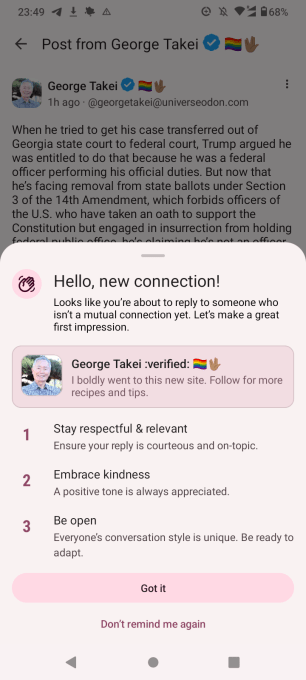Mastodon’s latest update is tackling a problem Twitter users know all too well: the scourge of the “reply guys.” A colloquial term for the men who regularly reply to women’s posts in an overly familiar fashion, often to “mansplain,” tone police, offer unsolicited advice or gaslight the original poster, reply guys have been a longtime problem on social media. Now, starting in the Mastodon app for Android, the company is experimenting with a simple reminder that will pop up when someone is about to respond to a stranger. The reminders may also include a bit of context — like if the stranger is an expert in their field, or if the post the user is replying to is old — to head off unnecessary or unhelpful commentary.
“While we’re exploring multiple different avenues to tackle this issue, the idea we’re experimenting with today is simply reminding people when they’re about to respond to a stranger,” explains Mastodon founder and CEO Eugen Rochko. “We also believe that by showing a bit of information about the person you’re about to talk to, we can prevent some awkward situations, such as explaining something to an expert in a given field.”

Image Credits: Mastodon
The feature will additionally remind users when they’re replying to a post that’s over three months old, as these are no longer considered part of an active discussion. Users’ older posts are often surfaced by mistake, prompting replies, because someone had searched a particular topic and came across a post in the search results.
Users can dismiss the warnings by tapping on the “Got it” button or a smaller, less obtrusive option, “Don’t remind me again.”
The new features are launching first on the Mastodon app for Android but will arrive on the iOS app soon, the company says. If the experiment proves successful, Mastodon will then bring them to the web interface as well.

Image Credits: Mastodon
The idea that small nudges can help change user behavior is something that Twitter, now called X, had already used to its advantage — at least in the pre-Elon Musk era.
For example, the company would pop up reminders that asked users if they had actually read the article they were about to retweet, or would ask them to share the tweet instead of taking a screenshot. Most notably, it also added a feature that would prompt users to revise “harmful” replies — meaning language that was abusive, trolling or otherwise offensive. Twitter’s internal data found that these small nudges could work, as 34% of people revised their initial reply after seeing the prompt or chose not to send their reply at all. After being prompted once, people then composed 11% fewer offensive replies in the future, the company also found. That indicates that the use of nudges could have a longer-lasting impact.
But on the flip side, overuse of nudges could quell conversation on the platform, which is supposed to be a place for sharing personal opinions and ideas. For that reason, there needs to be a balance between helpful nudges and freedom of expression.
In Mastodon’s case, framing the new feature as an “experiment” allows the company to tweak when or how often its nudges appear to users as it gathers more data about the nudges’ usefulness. Or, if it finds the nudges aren’t helpful, it can end the experiment and try something new.
“Overall, we’re committed to ensuring folks on Mastodon have a pleasant experience posting,” adds Rochko. “We hear time and time again how much people enjoy coming to Mastodon to have real conversations with real people. And we want to ensure it stays that way,” he says.
